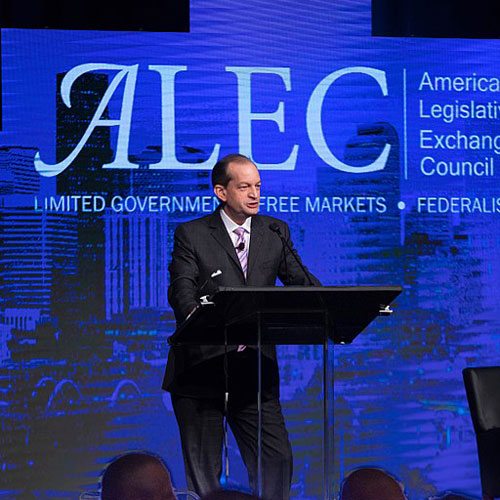
August 13, 2017; Washington Post
Knowing who is trying to influence public policy and how they organize their arguments is a critical skill for anyone who has an interest in good government. For example, the American Legislative Exchange Council’s (ALEC) criteria evaluate public education on how effectively it supports the strategy of choice and privatization.
On the surface, ALEC is just an average, run-of-the-mill, nonpartisan think tank focused on state and local government. It describes itself as “America’s largest nonpartisan, voluntary membership organization of state legislators dedicated to the principles of limited government, free markets and federalism.“ Among its members, which include 25 percent of state legislators, are representatives of businesses that seek to influence state governments and their policies. Through their model bills, they seek “real, state-based solutions to encourage growth, preserve economic security, and protect hardworking taxpayers.”
ALEC’s significant influence in many state houses makes the positions they advocate important to those who count on state government to be part of the solution to important community issues. Their recommended legislation serves as the basis for new policy and law in many states. But, is their interest in solving problems faced by individuals and improving the effectiveness of government programs? Or, are they more interested in an approach to government that supersedes the effectiveness of the programs they advocate for? Their approach to improving public education provides an insight to how important those questions are in considering ALEC’s work and that of other public influencers.
ALEC’s Report Card on American Education describes their model for educational success.
American students in coming years will not be assessed by how many hours they spend in the classroom, but by how well they have mastered each skill and concept. Learning will take place as quickly or slowly as a student can progress, and being behind in one subject will not jeopardize advancement in another. Graduation will be competency-based, not merely a marker of occupying a classroom seat for 13 years.
Sign up for our free newsletters
Subscribe to NPQ's newsletters to have our top stories delivered directly to your inbox.
By signing up, you agree to our privacy policy and terms of use, and to receive messages from NPQ and our partners.
What children learn during their years as students would seem to matter. Legislation and policy would be guided by these outcomes. Yet when they seek to grade how well public schools are performing, they use six factors: “academic standards, charter schools, homeschool regulation burden, private school choice, teacher quality, and digital learning”—none of which measure what students have accomplished.
This approach places states whose schools perform well on measures of actual student achievement at the bottom of ALEC’s ratings. According to Washington Post education writer Valerie Strauss, “The state that comes in last is…Nebraska, where more than 45 percent of adults have some kind of college degree….[Next] is Wyoming, which has a high school graduation rate of nearly 90 percent.” The fact that those strategies have yet to demonstrate positive results does not seem to matter.
On the other hand, at the top of the ALEC rankings stands Arizona, which has a low rate of high school graduation and whose students have not performed well on the National Assessment of Educational Progress. Arizona’s public schools struggle to fill their classrooms with qualified teachers. According to the Arizona Republic, 22 percent of the state’s teachers did not have a college degree and could not qualify for state certification. From ALEC’s perspective, Florida—again, a state where more traditional measures of school performance show modest results at best—ranks as the nation’s second-best school system. Washington, D.C., whose schools continue to struggle, is ranked as having the sixth-best system in the nation. What these systems share are policies that support choice, privatization, and market-based education.
This counterintuitive approach is more easily understood when considering who pays ALEC’s bills. Stalwarts of conservative politics that have given strong support to the privatization of public education are also significant funders of ALEC. In that list are the Lynde and Harry Bradley Foundation and the family foundations related to Adolph Coors, the Koch brothers, and the Scaife family.
Making public policy should be a fact-based, not a funder-driven exercise. Providing information to legislators and voters should emphasize real outcomes of policy implementation. There is a real danger when organizations like ALEC and other interest groups confuse their political philosophy with outcomes. In a Twitter world, being Number One may be more important than the reasons for that ranking. Yet for policymakers, knowing what’s behind those reasons is of critical importance.—Marty Levine












